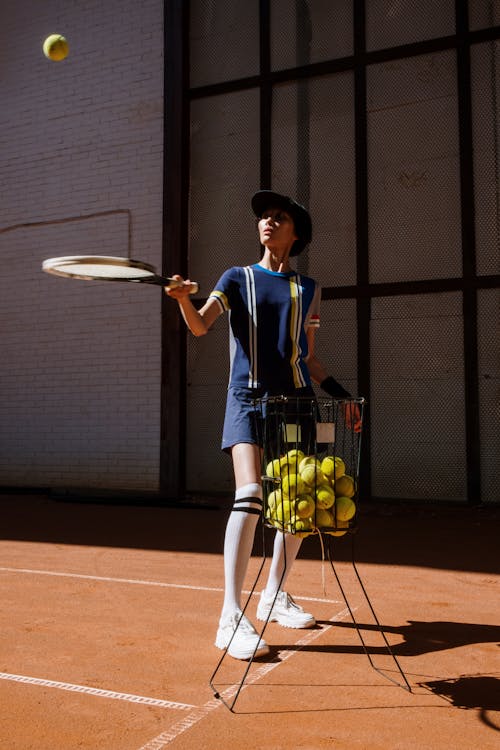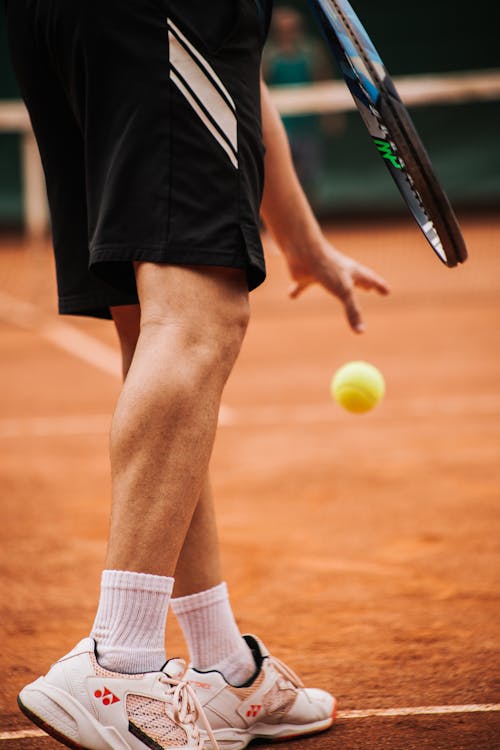In the world of competitive tennis, the physical demands are undeniable, but what about the mental toll it takes on young players? This article explores effective strategies for kids to manage mental fatigue during grueling tournaments and intense training periods. With practical tips and expert advice, young athletes can now overcome the challenges that mental fatigue presents, ensuring they perform at their best on the court.
1. Proper Sleep – Mental Fatigue in Tennis
Maintain a Consistent Sleep Schedule
One of the most crucial aspects of managing mental fatigue in tennis tournaments is maintaining a consistent sleep schedule. When you establish a regular sleep routine, your body and mind become accustomed to a specific sleep and wake-up time, which helps regulate your internal body clock. By going to bed and waking up at the same time every day, you provide your body with the opportunity to rejuvenate and recover. This consistency allows you to feel well-rested and energized, allowing you to perform at your best during both training sessions and tournaments.
Create a Calm Sleep Environment
Creating a calm sleep environment is essential in ensuring a good night’s rest. Eliminate any distractions that may interfere with your sleep, such as electronic devices or excess noise. Make your bedroom a peaceful sanctuary by keeping it clean, organized, and clutter-free. Additionally, invest in a comfortable mattress and pillows that provide proper support for your body. Consider using blackout curtains to block out any light that may disrupt your sleep. By creating a serene sleep environment, you can optimize the quality of your rest and reduce mental fatigue.
Get Enough Hours of Sleep
In addition to maintaining a consistent sleep schedule and creating a calm sleep environment, it is crucial to ensure that you are getting enough hours of sleep. The amount of sleep required varies for each individual, but generally, children and teenagers need between 8-10 hours of sleep per night. Sleep is essential for the body and mind to recover from the demands of intense training or tournament play. By prioritizing sleep and allowing yourself sufficient rest, you can prevent mental fatigue and perform at your best on the tennis court.
2. Balanced Nutrition – Mental Fatigue in Tennis
Eat a Balanced Diet
Maintaining a balanced diet is key to managing mental fatigue during tennis tournaments. Proper nutrition provides your body with the necessary fuel to perform at its best. Focus on consuming a variety of fruits, vegetables, whole grains, lean proteins, and healthy fats. These foods contain essential nutrients, vitamins, and minerals that support brain function and overall well-being. Prioritize foods that are rich in antioxidants, such as berries and dark leafy greens, as they help combat oxidative stress and improve cognitive function.
Stay Hydrated
Staying hydrated is vital for maintaining mental clarity and preventing fatigue. Dehydration can negatively impact cognitive function, mood, and physical performance. Make sure to drink enough water throughout the day, especially during intense training sessions and matches. Hydration needs vary depending on factors like activity level, climate, and individual differences. It is recommended to drink water before, during, and after physical activity to replenish lost fluids.
Consume Energy-Boosting Foods
To combat mental fatigue during long tennis tournaments, it is important to incorporate energy-boosting foods into your diet. Opt for sources of complex carbohydrates, such as whole grains, legumes, and starchy vegetables. These foods provide a steady release of energy and help sustain mental and physical endurance. Additionally, include lean proteins like chicken, fish, or tofu, as they help build and repair tissues, promote muscle recovery, and support brain function. Healthy fats, found in foods like avocados, nuts, and seeds, are also essential for optimal brain health and energy levels.
3. Effective Time Management – Mental Fatigue in Tennis
Plan and Organize Practice Sessions
Proper time management is crucial for preventing mental fatigue in tennis tournaments. Plan and organize your practice sessions in advance, ensuring that you allocate sufficient time for rest, recovery, and other essential activities. Break down your training sessions into specific drills and exercises, focusing on different aspects of the game. By having a structured plan, you can maximize your practice time and minimize mental exhaustion.
Set Realistic Goals and Prioritize
Setting realistic goals and prioritizing tasks is an effective way to manage mental fatigue. Break down your goals into smaller, achievable steps, allowing you to track your progress and maintain motivation. Prioritize your tasks based on their importance and deadline, ensuring you allocate enough time and energy to each one. By setting realistic goals and prioritizing effectively, you can prevent becoming overwhelmed by mental exhaustion and stay focused on your objectives.
Create a Daily Schedule
Creating a daily schedule helps you stay organized and manage mental fatigue during tennis tournaments. Plan your day in advance, including practice sessions, meals, rest periods, and other essential activities. Be sure to allocate time for breaks and relaxation to recharge your mind and prevent burnout. Stick to your schedule as much as possible, but also be flexible and adapt to unexpected situations. By having a structured daily schedule, you can effectively manage your time, reduce mental fatigue, and optimize your performance.

4. Mental Preparation – Mental Fatigue in Tennis
Practice Mindfulness and Relaxation Techniques
Practicing mindfulness and relaxation techniques can help alleviate mental fatigue and enhance focus during tennis tournaments. Take a few moments each day to engage in activities such as deep breathing exercises, meditation, or visualization. These practices can help calm your mind, reduce stress, and improve concentration. Incorporate mindfulness and relaxation techniques into your routine to promote mental clarity and overall well-being.
Visualize Success and Positive Outcomes
Visualizing success and positive outcomes is a powerful mental preparation tool. Spend time visualizing yourself performing at your best during training and tournaments. Imagine yourself executing flawless shots, staying calm under pressure, and achieving your desired results. By visualizing success, you can boost your confidence, minimize self-doubt, and reduce mental fatigue. Use visualization as a tool to enhance your mental game and perform at your peak.
Develop Mental Toughness
Developing mental toughness is crucial for managing mental fatigue in tennis tournaments. Mental toughness allows you to stay focused, overcome challenges, and perform under pressure. Build mental resilience by practicing resilience-building activities such as setting challenging goals, engaging in positive self-talk, and embracing adversity. By developing mental toughness, you can effectively navigate the mental demands of tennis tournaments and maintain a resilient mindset.
5. Breaks and Rest – Mental Fatigue in Tennis
Take Regular Short Breaks during Intense Training
Taking regular short breaks during intense training sessions is essential to prevent mental fatigue. Allow yourself brief periods of rest between drills or exercises to recharge your mind and regain focus. Use these breaks to hydrate, stretch, and clear your mind. By incorporating regular short breaks into your training routine, you can maintain mental freshness and optimize your performance.
Incorporate Rest Days in the Tournament Schedule
In addition to short breaks during training, it is crucial to incorporate rest days in the tournament schedule. Rest days provide an opportunity for physical and mental recovery, allowing your body and mind to recharge. Use these days to engage in low-impact activities, spend time with loved ones, or simply relax. By incorporating rest days into your tournament schedule, you can prevent mental fatigue and perform at your best when it matters most.
Listen to the Body’s Signals
Listening to your body’s signals is key to avoiding mental fatigue in tennis tournaments. Pay attention to signs of physical and mental exhaustion, such as persistent fatigue, decreased motivation, or difficulty concentrating. When you notice these signs, it is important to take a step back, rest, and recharge. Pushing through mental fatigue can lead to burnout and hinder your performance. Tune in to your body’s needs and prioritize self-care to prevent mental exhaustion.
6. Communication and Support – Mental Fatigue in Tennis
Seek Support from Coaches and Parents
Seeking support from coaches and parents is crucial in managing mental fatigue during tennis tournaments. Communicate openly with your coach about any concerns or challenges you may be facing. They can provide guidance, support, and tailored strategies to help you overcome mental exhaustion. Similarly, reach out to your parents or guardians and discuss your feelings and experiences. Their understanding and encouragement can be invaluable in managing mental fatigue and maintaining a positive mindset.
Discuss Feelings and Concerns with a Trusted Person
Having someone you trust to talk to about your feelings and concerns is important in managing mental fatigue. Find a trusted friend, sibling, or mentor who you can confide in. Share your experiences, frustrations, and achievements with them. Having an outlet to express your emotions can help relieve mental burden and provide valuable perspective. Don’t hesitate to reach out and seek support when needed.
Surround Yourself with a Positive Support System
Surrounding yourself with a positive support system is vital for managing mental fatigue during tennis tournaments. Surround yourself with individuals who uplift and encourage you, both on and off the court. Choose training partners, teammates, and friends who share your passion for tennis and foster a positive and supportive environment. Interact with people who believe in your abilities and inspire you to overcome challenges. A positive support system can help you stay motivated, resilient, and mentally refreshed.
7. Focus on Small Goals – Mental Fatigue in Tennis
Break Down Big Challenges into Smaller Achievable Goals
Breaking down big challenges into smaller, achievable goals is an effective strategy for managing mental fatigue. Rather than overwhelming yourself with the enormity of the task, focus on smaller milestones that lead to success. Set specific and measurable goals that align with your overall objectives. By achieving these smaller goals, you will build confidence, stay motivated, and prevent mental exhaustion.
Celebrate Each Accomplishment and Milestone
Celebrating each accomplishment and milestone is an important aspect of managing mental fatigue. Recognize and reward yourself for your hard work, dedication, and progress. Whether it’s winning a match, improving a specific skill, or achieving a personal best, take the time to celebrate your achievements. Acknowledging your accomplishments boosts confidence, enhances motivation, and reduces mental fatigue.
Stay Motivated by Focusing on Progress
Staying motivated and preventing mental fatigue can be challenging during long tennis tournaments. To maintain your drive, focus on your progress rather than the outcome alone. Reflect on how far you’ve come, the skills you’ve developed, and the lessons you’ve learned. Embrace the journey rather than fixating solely on the destination. By celebrating your progress, you can cultivate a positive mindset and effectively manage mental fatigue throughout the tournament.

8. Effective Stress Management – Mental Fatigue in Tennis
Learn Stress Reduction Techniques
Learning stress reduction techniques is essential for managing mental fatigue during tennis tournaments. Explore various techniques such as deep breathing exercises, progressive muscle relaxation, or yoga. These practices activate the body’s relaxation response and help reduce stress levels. Experiment with different strategies and find what works best for you in relieving stress and promoting mental well-being.
Practice Deep Breathing and Relaxation Exercises
Deep breathing and relaxation exercises are effective tools for managing mental fatigue. Engage in deep breathing exercises, taking slow, deep breaths in through your nose and exhaling through your mouth. This technique helps activate the body’s relaxation response, calms the mind, and reduces stress levels. In addition to deep breathing, incorporate relaxation exercises such as guided imagery or body scans to further enhance relaxation and minimize mental fatigue.
Engage in Healthy Coping Mechanisms
Engaging in healthy coping mechanisms is crucial for managing stress and preventing mental fatigue. Find healthy outlets that help you relax and recharge, such as engaging in hobbies, spending time in nature, or practicing mindfulness. Avoid turning to unhealthy coping mechanisms such as excessive use of technology, overeating, or avoidance behavior. By incorporating healthy coping mechanisms into your routine, you can effectively manage stress, prevent mental fatigue, and maintain overall well-being.
9. Positive Self-Talk – Mental Fatigue in Tennis
Replace Negative Thoughts with Positive Affirmations
Positive self-talk is a powerful tool for managing mental fatigue in tennis tournaments. Replace negative thoughts and self-doubt with positive affirmations and encouraging statements. Remind yourself of your strengths, capabilities, and past successes. Use positive self-talk to boost confidence, maintain motivation, and reduce mental exhaustion. By cultivating a positive internal dialogue, you can effectively manage mental fatigue and perform at your best.
Encourage and Believe in Yourself
Encouraging and believing in yourself is vital for managing mental fatigue. Cultivate self-belief by recognizing your abilities, focusing on your strengths, and embracing self-compassion. Remind yourself of your potential and worth, even in challenging moments. Encourage yourself to keep pushing forward and trust in your abilities. By fostering self-belief and self-encouragement, you can effectively manage mental fatigue and maintain a resilient mindset.
Use Self-Talk to Stay Calm and Focused
Using self-talk to stay calm and focused is crucial during intense tennis tournaments. Develop a repertoire of calming phrases or cues that help you stay composed under pressure. Use self-talk to redirect your focus to the present moment, block out distractions, and maintain a positive mindset. By utilizing self-talk effectively, you can stay calm, focused, and mentally fresh throughout the tournament.
10. Utilize Performance Strategies – Mental Fatigue in Tennis
Develop Rituals and Pre-match Routines
Developing rituals and pre-match routines is an effective performance strategy for managing mental fatigue. Establish a consistent routine before matches that includes physical warm-up exercises, mental preparation techniques, and visualization. Rituals and routines help create a sense of familiarity and control, reducing stress and mental exhaustion. By utilizing pre-match rituals, you can optimize your mental state and perform at your peak during tennis tournaments.
Create a Strategy for Handling Pressure Situations
Creating a strategy for handling pressure situations is essential for managing mental fatigue. Develop specific techniques for coping with the stress and pressure that comes with tournament play. This may include deep breathing exercises, positive self-talk, or visualization. Implementing a strategy helps you stay composed, focused, and resilient during challenging moments. By preparing for pressure situations, you can effectively manage mental fatigue and perform at your best.
Focus on the Process rather than the Outcome
Focusing on the process rather than the outcome is a valuable mindset for managing mental fatigue. Shift your attention to the present moment and the steps you need to take to achieve success. By focusing on the process, you can stay engaged, motivated, and emotionally balanced. Embrace the journey of improvement and skill development, rather than fixating solely on winning or losing. By adopting a process-oriented mindset, you can effectively manage mental fatigue and perform at your highest potential.
In conclusion, managing mental fatigue during long tennis tournaments or intense training periods requires a holistic approach. By prioritizing proper sleep, balanced nutrition, effective time management, mental preparation, breaks and rest, communication and support, focus on small goals, effective stress management, positive self-talk, and utilizing performance strategies, kids can effectively manage mental fatigue and perform at their best on the tennis court. With these strategies in place, young athletes can approach tennis tournaments with confidence, mental resilience, and the ability to overcome mental fatigue for optimal performance.


